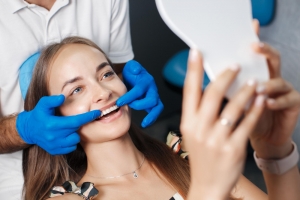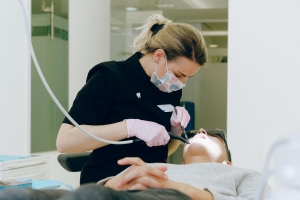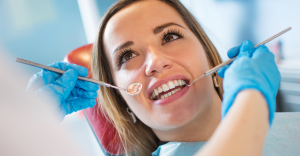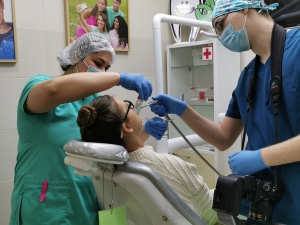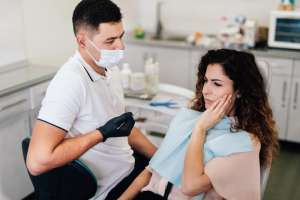Dental emergencies are one of the most stressful things that can happen to you. It’s painful, uncomfortable, and inconvenient. At times like these, it’s best to have an emergency dentist you can head straight to to help save your teeth so you can achieve a stable smile again. But what exactly constitutes a dental emergency? In this article, we’ll lay out some of the most common dental emergencies and how you can prevent them.
Knocked-out tooth.
Probably the most common of all dental emergencies is a knocked-out or avulsed tooth. People who experience this have their whole tooth dislodged from their socket, so emergency treatment is a must. But don’t worry, there are cases wherein dentists were able to restore the tooth to its socket within the hour, as long as appropriate action is taken. A knocked-out tooth is a time-sensitive situation, which is why it’s urgently advised to head straight to Fitzroy emergency dentists or other dental clinics that offer emergency dental services.
Chipped or fractured tooth.
As the name suggests, your tooth may have a chip or fracture, but it should still be treated with urgency and care since the exposed area is susceptible to sensitivity and pain. If left as it is, it may even cause severe pain.
Soft tissue injuries.
Injuries that fall under this category usually include cuts to the lips, cheek, tongue, or even gums, which can be caused by blunt trauma or impact.
Toothaches.
Everyone has suffered a toothache at least once or twice in their lives. But compared to regular toothaches, there are those severe enough to cause persistent, throbbing, and sharp pain. If suffering from such, there’s a chance that you may be suffering from a cavity, and it has penetrated the pulp and reached the nerve.
Abscesses.
An abscess inside your mouth is a sure sign that there’s a serious infection. It’s a painful, pus-filled pocket usually located at the tip of the tooth decay or in the gums. If left unchecked, this infection can spread throughout your body and do more damage.
Lost filling or crown.
Sometimes, some foods are too hard for our teeth, so when we bite into them, our tooth’s crown or filling can get damaged. This doesn’t necessarily hurt, but what’s concerning about it is that it leaves the nerve tissue or sensitive dentin exposed. When this happens, you can feel a sharp pain, especially when you brush against it unconsciously or whenever you consume hot or cold food or drinks.
Objects stuck between teeth.
Food particles like popcorn kernels or shells tend to get lodged in the crevices of our teeth. These hard pieces are small and are not only uncomfortable but can also cause cuts in your gums and tongue.
Loose wire or bracket.
Sometimes, braces can also cause dental emergencies, especially when the wires come loose. They can poke your cheek and gums, causing cuts that require repair or trimming.
Broken dentures.
Once a denture breaks, it’s unusable. As a result, it may impede a person’s ability to speak or eat, which makes it a functional emergency, thus requiring a trip to the emergency dental clinic.
How to prevent these trauma-related injuries:
Now that you have an idea of what the common dental emergencies are, here are some helpful tips to prevent, if not aid you from, them.
Wear a mouthguard and nightguard. Wearing a nightguard is not only a necessity, but it’s also the most effective way to prevent yourself from getting your teeth knocked out. The mouthguard will serve as a cushion in case of accidents, preventing tooth and jaw injuries. Nightguards, on the other hand, are ideal to wear for those who tend to grind their teeth during their sleep and to prevent the wear and tear of their crowns and fillings.
Do not use your teeth as tools. You’ve probably heard this from your dentist a million times, but stop using your teeth as tools to open chips and bottles or to tear packaging, since it can lead to fractures.
Wear a seatbelt and helmet. Tied to wearing mouthguards, you should also make it a habit to wear your seatbelt and helmet to avoid facial trauma.
Maintain regular checkups. Dentists can spot potential problems through X-rays and oral exams, which is why it’s important to show up to your regular dental checkups consistently. By doing so, you’re saving yourself unnecessary pain and extra expenses by addressing the potential problem from the get-go. Besides that, your dentist also advises you on the best oral hygiene practices so you can take better care of your teeth.
Address sensitivity immediately. At the first sign of a severe toothache, it’s best to head to the dentist immediately if over-the-counter painkillers are not working. A dentist can check if there’s an underlying condition, and if there is, they can take appropriate actions to fix it.
Follow orthodontic instructions diligently. When one wears braces, there’s a list of dos and don’ts as well as food one should avoid so as not to mess up their braces. It’s best to follow your orthodontist’s instructions so that your braces stay in place.
Dental emergencies are painful and costly. However, many of them are preventable, as long as you practice the aforementioned and make it a point to schedule regular dental checkups with your dentist.

